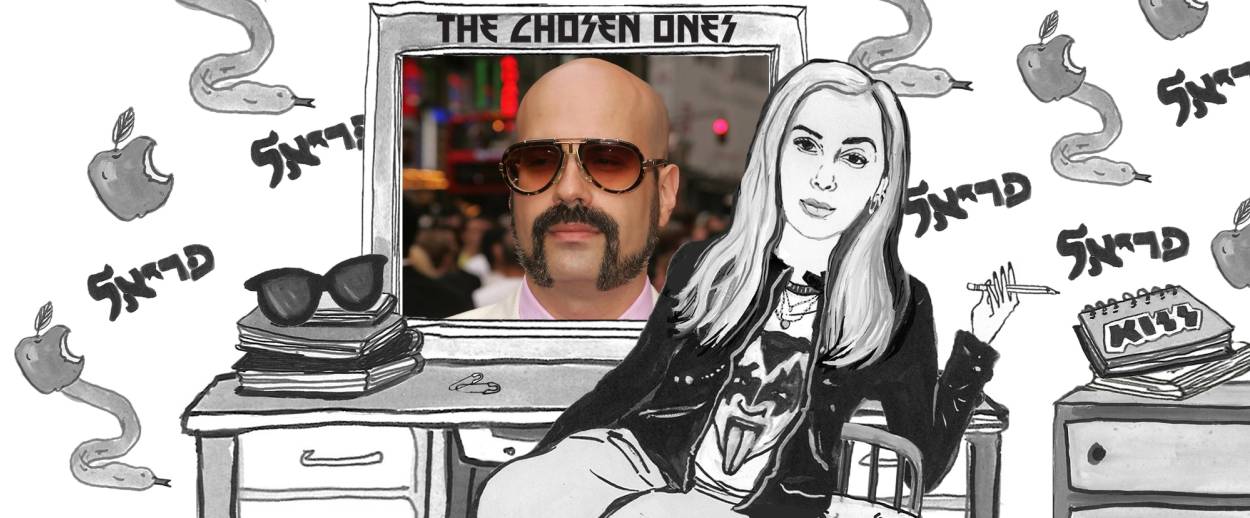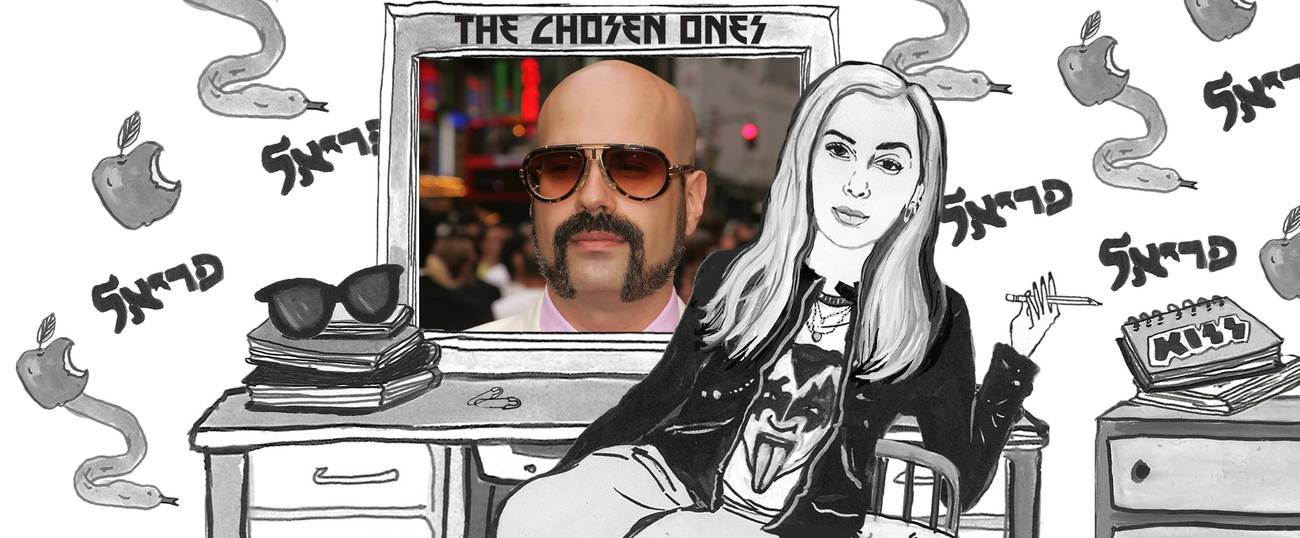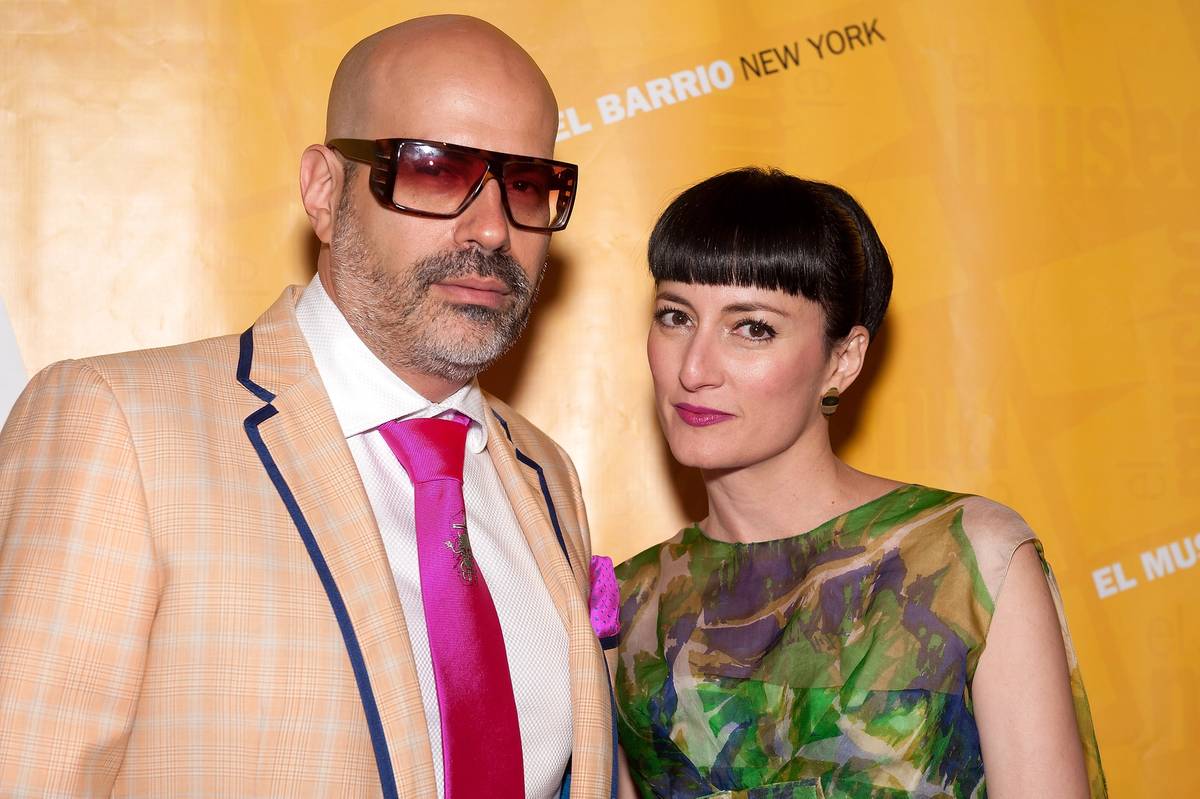The Chosen Ones: An Interview With Andres Levin
The Grammy Award-winning producer, filmmaker, and philanthropist on his family’s escape to Buenos Aires from Berlin in the 1930s, and splitting time between New York City and Havana




AndresLevin’s list of accomplishments is long: musician, record producer, philanthropist, and 10-time Grammy winner. His band, Yerba Buena, which he founded with his wife and partner Cucu Diamantes, was lauded “a musicologist’s dream” by The New York Times and “the future sound of Afro-Latin Urban America” by Interview magazine. He has collaborated with and written songs for the likes of Natalie Merchant, Michael Stipe, Juanes, David Byrne, Femi Kuti, and Macy Gray, to name but a few. Together with his wife he also founded Music Has No Enemies, a non-profit designed to create content with a purpose and promote philanthropy in the entertainment industry.
Levin is tall and burly with a shaved head, often sporting a horseshoe mustache and signature tinted glasses (not in a douchey way, he actually needs them to see). The grandson of Holocaust survivors—Dre, as his friends call him—was born and raised in Caracas, Venezuela, after his parents escaped there from Buenos Aires. From there he bounced around a bit and eventually ended up in NYC. He met Cucu 15 years ago and the two of them have more or less been splitting their time between Havana and New York City ever since. To say he is an expert in Cuba is probably an understatement. He has become the first point of contact for anyone in the entertainment industry who wants to get anything done there. And now that the borders are open, his services are in demand more than ever. I met with him at the Bowery Hotel, a few days after Fidel Castro died. The next day, he’d board a flight from JFK to Havana, the third direct flight of its kind, ever.

Periel Aschenbrand: You have such an interesting and, dare I say, unusual Jewish identity.
AL: Yes. I do. My mom’s side came from Germany, my grandmother, Catalina Wolf, was born in Berlin on Valentine’s Day in 1900.
She was a fashion photographer turned Broadway musical agent for Buenos Aires’s biggest theaters, and she lived to be 95. Through her early years, she was one of the only female fashion photographers in Berlin at the time. And then, in the late 1930s, she escaped Berlin with two of her brothers while she was pregnant with my mother. The other [brothers] stayed and were captured.
PA: And killed?
AL: Yes. My mom was born in London, and then weeks later they got on a boat to Buenos Aires.
PA: They just escaped with their lives.
AL: Literally. Her brother, Rudolf Vitkover, who went to London and stayed in London, became an authority on Renaissance art. I knew he was important because I have a lot of his books, but in the past five years I’ve met with very prominent curators and learned that he basically wrote the bible on Renaissance art. It was a very intellectual, bohemian, well-off family in Berlin.
One of the brothers stayed behind, because he didn’t think anything was going to happen. When my grandmother got to Buenos Aires, she got in touch with him and said,
“Sell whatever you can and send me the cash.”
PA: He didn’t want to come?
AL: He didn’t want to come. The other part of the family didn’t want to come because they didn’t think anything was going to happen. So he sold what he could—he had a tomato paste company—and sent the money hidden under ketchup, inside a can, on a boat. And that’s how my grandmother bought her house in Buenos Aires, which is where she lived until she died. And it was basically a temple. Every Saturday she used to have an open house.
PA: I just got goosebumps! Like a real temple?
AL: No, no. Like a house that was a temple for all the artists.
PA: Haha, OK. That’s good, too.
AL: There was a lot of partying. I have pictures starting in the 1940s… all the actors and Borges used to come frequently, so from like 11 until 6 a.m. it was food and drinks.
PA: Wow. And that’s how your mom grew up?
AL: My mom grew up around that, yeah. She grew up in Argentina and then she met my dad in Buenos Aires. They were both very left wing. My dad’s side is Russian- Jewish and they came to Argentina two generations before. My parents met and fell in love and literally at the end of the 1960s it was exile for a lot of the students and teachers and Venezuela opened their doors. So they basically, along with 1000 others, went. Mostly scientists.
PA: Your parents are scientists?
AL: Biologists. They went to Caracas, the university there opened their arms to Argentinian dissidents and a lot of their peers disappeared and the story basically repeated itself. I was born there nine months later.
PA: So it really was the same story.
AL: Same fucking story.
PA: And then?
AL: My mom got a Guggenheim to do her PhD at Duke, so we moved to North Carolina, where I fell in with a bunch of black friends, learned what racism was…
PA: Wait, so why do you have that crazy accent?
AL: Which one?
PA: Your Latin one.
AL: I went back to Caracas for high school.
PA: Ah, OK. Were you always obsessed with music?
AL: Yes. Since I was 7.
PA: Venezuela is in a tough situation right now, to say the least, huh?
AL: It’s terrible. It’s very unclear how they will get out of this. I haven’t been back in like eight years. My ties with Venezuela are more like it was a womb rather than a home.
PA: Where’s home?
AL: New York. Cuba. Buenos Aires, which is where all my cousins and my crazy uncle and lesbian aunts are. It’s a beautiful city. My whole family has been hounded by exile and “going back.” It haunts them. I actually went back to Germany with my grandmother for the first time when she was 80. It was me and her and a wheelchair.
PA: Talk to me about Castro. I feel like I was at a dinner party with you a few years ago and there were like Secret Service people there and one of the Castros were with us or something. What was going on?
AL: I can’t remember exactly what that was but one of the things I’ve been working on is TEDx Habana and within that project, I work with a lot of designers and programmers and artists and scientists and the LGBT community. One of the most advanced LGBT sexual education programs in Latin America is run by Mariela Castro, which apart from her blood relations, is what she’s been doing all her life.
PA: Who is Mariela Castro?
AL: Raul’s daughter.
PA: Castro’s brother’s daughter, yes?
AL: Right. So we’ve collaborated on a lot of projects concerning culture and education. Listen, I’ve been there for 10 years now and my belief in the Cuban youth goes so far beyond politics. The Cuban people have so much potential and desire to thrive and it’s very different from what people perceive. People there are very resilient very optimistic and very smart, and they have a lot of things there that we’ve lost here—families values, sense of humor.
PA: Haha.
AL: Not to say that a lot of people haven’t suffered a lot. But they also have things that most of the world doesn’t have.
PA: Like what?
AL: Health care and education. Eleven million educated people. It’s the most highly educated country in the world.
PA: Right. It sounds complicated.
AL: It is. I don’t know what going to happen now. Between Trump winning here and Castro passing there…
PA: Oy.
AL: I want to really protect the true Cuban experience and I’ve grown very attached.
PA: Tell me a little about that.
AL: One of the projects, called Habanico Travel, I started is a socially responsible travel company focused on the arts, Ted subjects, entrepreneurship, protecting Cuban culture.
PA: That’s very cool. What else are you working on?
AL: The film stuff, started in 2009 with the film about Cucu, she was historically the first Cuban American to tour the whole country. And that made me fall in love with producing movies instead of just music and I’ve done about five films since. This year we were involved in the first Hollywood feature, The Fast and Furious, the first nine minutes in the film are in Havana, and we were the local production company but it was massive, there were over 2000 people working on it.
PA: So cool.
AL: Yeah, and in the beginning of the year, the Stones came, Obama came, Chanel came.
PA: What do you mean Chanel came?
AL: Chanel did their main fashion show there. They closed down the main avenue. Lagerfeld was there walking around with his little dog.
PA: His dog? I thought he had a cat?
AL: Maybe it was a cat.
PA: He brought the fucking cat with him to Cuba?
AL: Yeah.
PA: Choupette. You know she has her own maid?
AL: No. I wish I did know that. He probably brought the maid, too.
PA: Are there many Jews in Cuba?
AL: Yeah! There are three temples. There is a kosher butcher shop, too.
PA: I can’t believe there are Jews in Cuba. There’s like a full blown Jewish community?
AL: Yeah, a full blown community. Three active temples, two cemeteries and a really funny kosher butcher shop.
PA: What’s it called?
AL: I don’t remember, but they have this van, it’s like a SWAT van with flames on it, with an refrigerator. They’re the only real Sephardic Jews in the neighborhood.
PA: They’re Orthodox?
AL: Yeah.
PA: They have a van with flames on it because, like, that’s what they got?
AL: Yeah, they’re not like goth.
PA: Ha!
AL: So there’s a lot of that going on, Havana is a very surreal place.
PA: So basically you’re the first point of contact for anyone who is coming to Cuba to do anything important.
AL: I mean, I’m the only person I know who lives in Havana and New York and is in the entertainment business. It’s a very vivid, sensual, fun active destination. Cuba has actually reinforced a lot of my being Jewish and having compassion, which I think the most important of being Jewish.
PA: That’s interesting. I love that. It sounds magical.
AL: You can come for lunch, now. It’s only an hour-and-a-half flight. Israelis and Cubans have a lot in common.
PA: Speaking of lunch… What’s your favorite drink?
AL: So many. Depends on the day.
PA: Today is Tuesday.
AL: Today would be an Old Fashioned.
PA: How do you eat your eggs?
AL: Scrambled.
PA: How do you drink your coffee?
AL: Cortado. Or, like they say in New York, Cor-tah-doh.
PA: What’s your favorite Jewish Holiday?
AL: Hanukkah.
PA: Oh good. That’s timely. Why did you have a bar mitzvah?
AL: No.
PA: Gefilte fish or lox?
AL: Lox.
PA: Favorite pair of shoes?
AL: Like that I own?
PA: Well, not that somebody else owns. Your favorite pair of shoes!
AL: My sneakers. Regular Nike sneakers.
PA: Five things in your bag right now?
AL: I don’t have a bag right now.
PA: I was going to ask you what shampoo you use but that seems like a ridiculous question to ask since you’re bald. What do you wash your head with? Soap?
AL: Soap.
PA: What kind of soap do you use?
AL: It doesn’t matter. But I do shave it every day and I can shave it in the shower with no soap in like 30 seconds. I can literally shave it dry. Once a month I’ll go to the barber.
PA: Like, the fancy barber in NoLiTa?
AL: My barber in Havana is fifty cents. The one here is eighty dollars.
Periel Aschenbrand, a comedian at heart, is the author of On My Kneesand The Only Bush I Trust Is My Own.